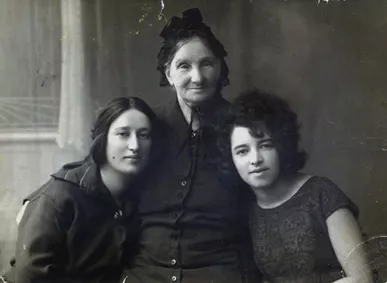Ester Gurvich with her grand daughters Anna Gurvich and Anna Burstein
In the center is my grandmother Ester Gurvich wearing a cap, to the left is my sister Anna Gurvich, to the left is my cousin Anna Burstein. The picture was made in Kaunas in the 1930s.
My paternal great grandfather was a chimney sweep. I do not know his first name, just surname - Gurvich. Great grandfather was from Lithuanian town Rumsiskes [80 km from Vilnius]. At that time, prior to Lithuanian independence from Russian empire, great grandfather, a simple chimney-sweep, dreamt of getting rich. His dream came true. It was like a fairy-tale. A poor chimney-sweep, who bought all kinds of lotteries, won an all-Russian lottery prize. I do not know exactly how much money he got, but at that time it was a real fortune. My great grandfather bought a large house in Kaunas. He lived with his family there and raised his children. I have no idea how many children great grandfather had. One of them was my grandfather Jacob Gurvich, a rabbi of one of the many Kaunas synagogues. I did not know grandfather. He died in 1911. He was not senile; he died at the age of 60. During First World War the whole family- grandmother, her children and their families along with many others Jews were exiled from frontier Territory of Russian Empire to more remote districts of the country. They happened to be in Volga region, the town of Kineshma, Ivanovo oblast [400 km from Moscow], where they had spent couple of years. Upon return to Lithuania grandmother started living with the family of elder daughter Bluma. She survived grandfather by many years. She was a true Jewish woman, who observed all Jewish traditions. I do not remember her with her head uncovered. There was always a neat head kerchief, tied in a special way. It looked like a cap. Grandmother loved her grandchildren very much. She was a sweet and kind woman. In spite of being rabbi's wife, Ester's views were rather democratic. She had a keen interest in modern life, politics. She enjoyed watching movies and had her opinion in things. Grandmother helped daughter about the house and with raising children. Until the end of her days, she had been strictly observing Kashrut, fasting. She lit Sabbath candles, marked Jewish holidays. In a word- she kept Jewish spirit in the house. My grandmother died in the 1930s. She was buried in accordance with the Jewish rite.
Ester and Jacob had five children - two daughters and three sons. All grown-up children with their families lived in a large house, demised by a great grandfather. That two-storied square-shaped house had a yard and adjacent premises as well as twenty apartments. There were enough apartments for all children. The remainder was leased. The house pertained to grandmother Ester. After her death in accordance with the Jewish law the property was devolved by the eldest son, i.e. my father. Father, in his turn, divided the property among his relatives.
Bluma, born in 1870s, was the eldest in the family. Her husband's name was Burstein. I had never seen her husband. He left for America long before I was born. Bluma's husband was supposed to invite her and children to the USA as soon as he had settled in. After his departure Bluma received no letters from her husband. He vanished into a thin air and Bluma did not manage to hear from him again. She had to make a living somehow, so she opened up a small grocery store in one of the rooms of our house. Bluma's daughter Anna (Jewish name Hana), born in the 1910s, married a musician and composer Klinitskiy before war. Bluma died in late 1930s. Anna and her husband were lucky to run away from Germans in June 1941 [Great Patriotic War] and stayed in evacuation. There they organized a Lithuanian music band, where Anna's husband was a leader. After war they came back to Lithuania and settled in Vilnius. Klinitskiy became a rather popular compose and their family was rather well-to-do. Anna did not have children. She died in Vilnius in. 1995.
My sister Anna finished Yiddish lyceum. In 1930s Anna had worked in the state archive. At the beginning of 1943, when it was declared that women were drafted in Lithuanian division, Anna was drafted. She became a radio operator. She had served with the Lithuanian division until the end of war. Anna lived in Riga after demobilization. Anna was single, she loved my son and helped me with everything.
















